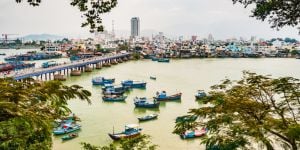So I would need to get my original transcript, degree, teaching certificate, police clearance, and medical record appostilled. At $25-$30 each, I was hoping to avoid anything that's not necessary =[ . What actually happens to my degree when it is appostilled? Do they put a marking or stamp on top of it?
Not exactly.
1) Get nothing appostiled. Vietnam is not a party to the Hague Treaty so appostiles mean nothing. Appostiles are a method of certifying at the local or state level and forgoing national certification. The documents need to be certified. You can do this in the US but in many ways it is easier once you are in Vietnam.
2) Forget your transcript. Unless you plan to teach regular subjects at an international school, you will not need it to teach English. Bring it along but don't certify it unless you need to. Your university may give an option of a notarized transcript but I wouldn't go any further than that.
3) Unless you feel like driving to NYC or DC, don't bother to certify your documents at the Vietnamese embassy or consulate. First you will need to notarize locally, then certify at state level, then US Dept of State, then VN Embassy. Doing it in VN is a two step solution. Additionally, they are difficult to deal with by mail and I have been told even difficult to deal with over the phone if you speak Vietnamese. It may be a little better in person but I still advise against dealing with them.
3) I too was a little reticent about a Vietnamese government red stamp on my diploma, but you don't need to do that. Bring your diploma to VN, then notarize a copy at the US consulate. They don't exactly notarize the copy, but notarize your statement that it is a true copy. They have the exact wording. You then take it to the Office of External Relations to be translated and certified. In HCMC that is at 06 Alexandre de Rhodes near the palace or at least it was in 2012 when I did it. The consulate will give you the address. There, they will fold the statement over the copy and put the red stamp on both of them.
4) Same thing with your TEFL certificate unless you get it in VN which may prove even easier.
5) Get your police record from state authorities in NJ while you are there. As NJ requires fingerprinting they do not offer a fully online option. http://www.njsp.org/criminal-history-records/
Bring it to VN and handle as in 3 &4. FBI check can come notarized, but takes way too long.
6) The medical record is based on an examination you get in Vietnam. Any school will have a list of appropriate hospitals.
As a bilingual, all this should be easier for you than it is for monolingual English speaker. I assume you have read threads that discuss hiring prejudices against Viet Kieu so I will not go into that here.
 Internships in Vietnam
Internships in Vietnam Working in Vietnam as a digital nomad
Working in Vietnam as a digital nomad The Vietnamese labor market
The Vietnamese labor market Working in Nha Trang
Working in Nha Trang Working in Hoi An
Working in Hoi An Working in Da Nang
Working in Da Nang Working in Hue
Working in Hue Hanoi's labor market
Hanoi's labor market


